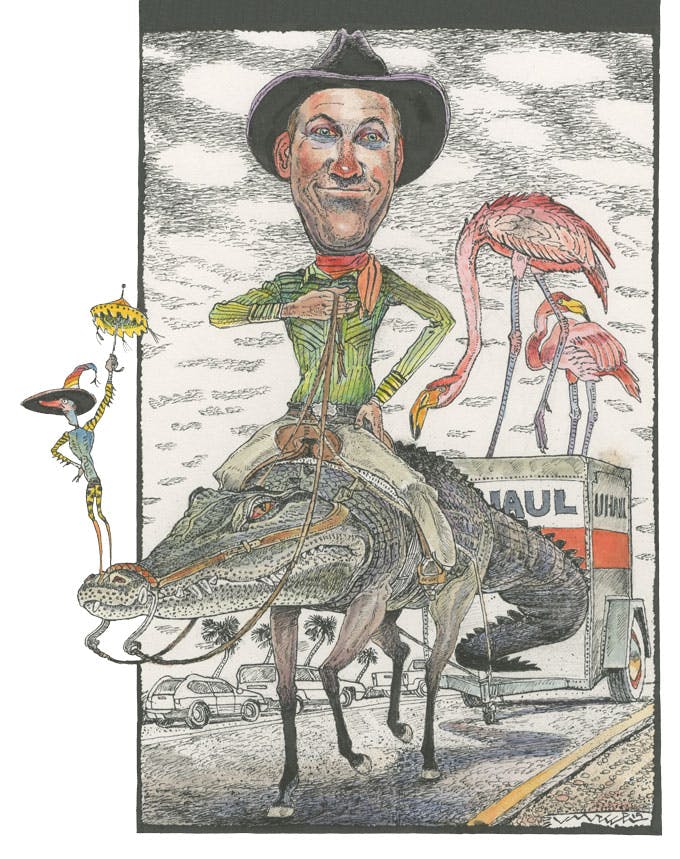
Q: My husband and I graduated from what is now Texas State University on a Saturday and married the next day nineteen years ago this past December. We then promptly moved to Florida for my hubby’s career. Whenever we are asked where we are from, we always say that we are Texans living in Florida. But recently my husband responded that we were from Florida. The horror! Will you please explain to him why this cannot continue?
Suni (and Curtis) Parks, Jacksonville, Florida
A: The very first letter the Texanist ever responded to, way back in July 2007, was an inquiry that involved just this subject. The place from which one hails can be an integral part of one’s general makeup and can say a lot about a person. It’s important information to both get from someone and give to someone. And conveying it properly is crucial. From boardrooms to barrooms to bedrooms, the “Where are you from?” inquiry is a standard of introductory small talk, and whenever it is made, the questionee ought to be able to look his or her questioner in the eye and clearly, plainly, and hopefully proudly say the name of some place. As the Texanist pointed out to Texas-born New York resident Kate von der Porten in that inaugural bit of fine advice, there are contextual nuances to consider, but your own response—“We are Texans living in Florida”—is perfecto for your particular case. Your husband’s recent misstep is troubling, though. The Texanist fears that his brainpan may have become overly sun-kissed after those near two decades of life in the Sunshine State and that this may be the cause of his confusing the place where he currently resides (Florida) with the place from whence he came (Texas). These are two very different places. The Texanness you and your husband possess comes with no expiration date, but each individual holder is responsible for maintaining its upkeep. It would be a shame for him to unwittingly forfeit his by responding to the simplest of questions inaccurately. Perhaps it’s time to saddle up and head on home for a spell.
Q: There are two camps on where to place the emphasis when pronouncing the name of Dallas’s neighbor to the west. One says FORT Worth (as in COLD beer) and the other says Fort WORTH (as in chardonNAY). In which group does the Texanist fall?
Name Withheld, Sweetwater
A: Thanks a lot for your letter, Mr. or Mrs. Name Withheld. The Texanist will have you know that he has spent the past several days researching this question and that his wife, daughter, co-workers, bank teller, golf buddies, barber, dentist, bartender, H-E-B checkout gal, barista, and family dog have all expressed some concern with regard to his mental state. Fort WORTH, FORT Worth, Fort Worth, FORT WORTH. The Texanist has been repeating it and repeating it both to himself and aloud (sometimes very aloud), and it has been maddening for everybody. After all of this, as best he can tell, he seems to switch somewhat equally between the various options depending on his mood, whom he is or is not talking to, and the direction of the wind. As a result, the Texanist has decided to stick with Fort Worth’s alternative pronunciations: Cowtown, Panther City, and the Queen of the Prairie Cities. The Texanist has further concluded that all this tiring investigation has left him in desperate need of a COLD charDONnay!
Q: My daughter, who is a freshman at Texas Tech, has been lobbying very hard for permission from me and her father to travel to Cancún, Mexico, with three of her girlfriends for spring break. In her short time out of the nest she has proved herself to be an unusually levelheaded young lady, and the other girls’ parents have agreed to let their daughters go. Even so, we’re having a hard time making this decision. Should we let her?
Name Withheld, via email
A: The Texanist was not fortunate enough to have had the opportunity to travel down to the Mexican mecca of college spring break during his school days, but he recalls hearing all the stories. Without getting into all the grimy details, it sounded like a hell of a good time. But then, with the free-flowing beer and tequila slammers, seas of like-minded collegians, and the untethered freedom that comes with first-time international travel sans parental units, how could it not? In your daughter’s favor it appears that, judging from your brief description, she possesses a level of maturity light-years beyond that of the Texanist’s knuckleheaded cohort when they were her age. And still, against all odds, they managed to survive. That said, travel south of the border shouldn’t be taken lightly, and you are right to be so thoughtful about your daughter’s well-being. The Texanist is the father of a young girl himself, and he too has become a devotee of the better-safe-than-sorry philosophy. Thus, you should know that the U.S. Department of State did, last Cinco de Mayo, issue a travel warning for Mexico, alerting visitors to potential dangers. The state-by-state breakdown of specific threats on their website, though, has a “no advisory is in effect” for the state of Quintana Roo, where Cancún is located. This is another plus for your daughter. The packing list for a safe trip should always include a little precaution, some good judgment, and a bit of suerte (that’s Spanish for “luck”), and you’ve got two out of these three locked down. Your precious daughter is not the Texanist’s precious daughter, but he’s willing to let her go if you are. The Texanist bets she and her friends will have a blast. Here’s the contact information for the Cancún office of the U.S. Consulate just in case.
Phone: 52-998-883-0272
Fax: 52-998-883-1373
Email: ConAgencyCancun@state.gov
Q: While hosting co-workers from New York for dinner at a local Tex-Mex place, I recommended the brisket tacos. One co-worker looked at me and asked, “What is brisket?” In total shock at being asked a question akin to “What is truth?” or “What is love?” I sat there mute. How should I have answered?
John Thomas, Dallas
A: The sudden state of slack-jawed flummox that you were thrown into by the New Yorkers at the Tex-Mex restaurant is understandable. But it’s a shame that you were rendered totally mute. Because while you could have gotten away with simply saying that brisket is a cut of beef that comes from the chest area of a cow, it looks as if you had the beginnings of what would have been a fine soliloquy for the situation. It might have gone something like this: “ ‘What is brisket?’ you ask? What is truth? What is love? I’ll ask you in return. Colleagues from the Big Apple, listen to me. This mess of tacos we’re about to order, they’ll come filled with succulent slices of the very pièce de résistance of all of Texas’s smoked meats—the slièces de résistance, if you will. Brisket, my friends, when it is prepared to its full potential—rubbed liberally with kosher salt, coarse-ground black pepper, and maybe a few other secret spices and then smoked with care over a fire of oak, mesquite, pecan, or some combination thereof for hours upon hours—exudes a combination of flavors, textures, and overall toothsomeness that, in the realm of comestibles, is simply without match. And this, New Yorkers, is brisket. Thanks for coming down to Texas, y’all. Hey, what say we get a round of cold beer and some chips and queso? Wait, ‘What is queso?’ Who said that?!” If you ever find yourself in this situation again, the Texanist advises speaking from the heart. An exclamation of such deep feelings is always appreciated.
The Texanist’s Little-Known Fact of the Month: The peculiarly pleasant oddity of olfaction wherein a dog’s paws smell exactly like a familiar salty snack food is caused by two common bacteria, proteus and pseudomonas, and in honor of the Plano-based Frito-Lay company’s popular namesake corn chip, is known colloquially as “Frito feet.”








